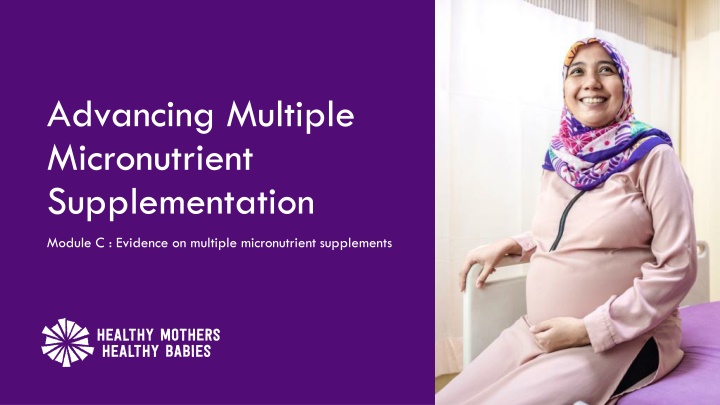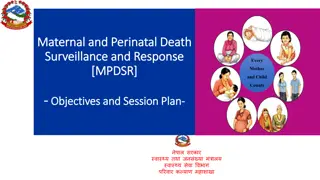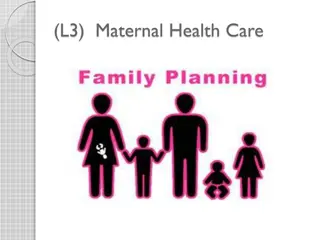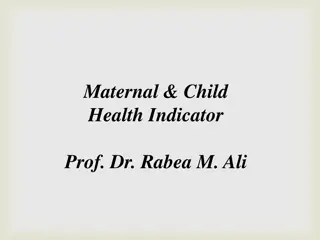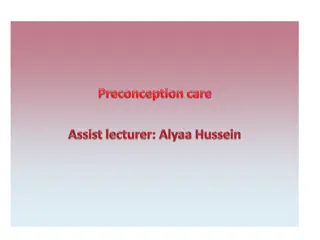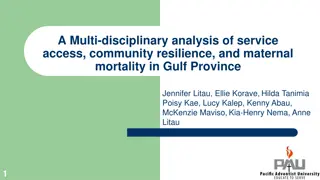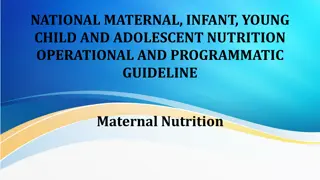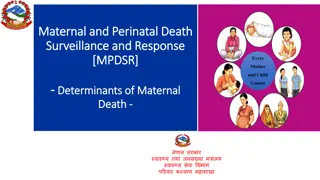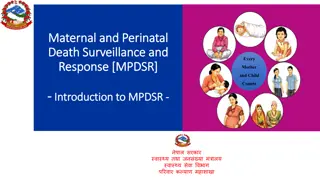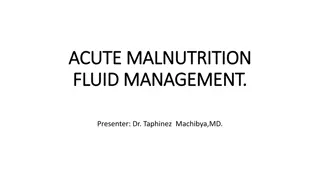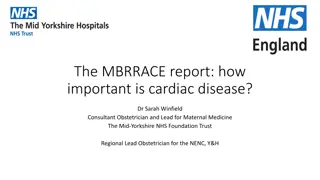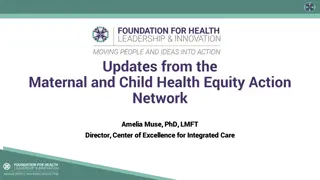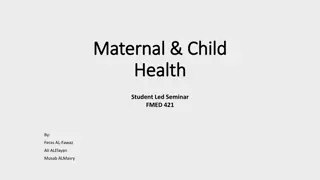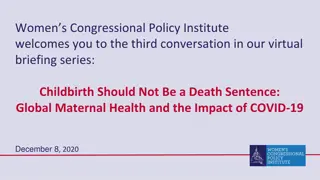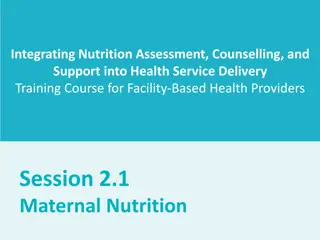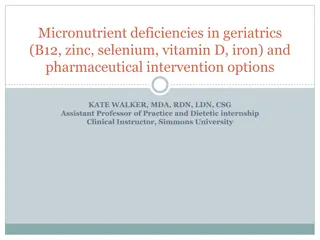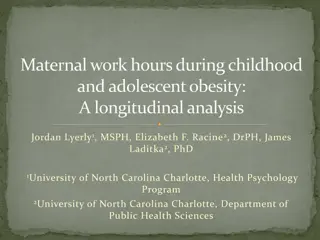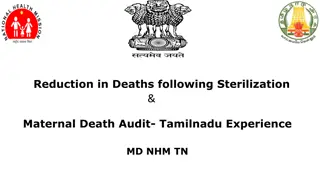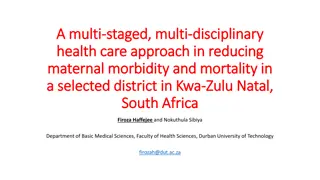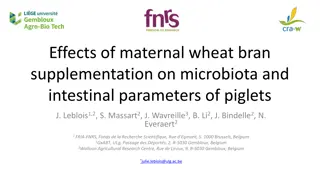Evidence on Multiple Micronutrient Supplementation for Maternal Health
Multiple Micronutrient Supplementation (MMS) offers significant benefits compared to Iron and Folic Acid (IFA) for pregnant and nursing women. UNIMMAP MMS contains 15 essential vitamins and minerals, meeting requirements poor diets cannot fulfill. Research supports the effectiveness and safety of MMS over IFA, with various meta-analyses confirming its efficacy in improving maternal and neonatal health outcomes.
Download Presentation

Please find below an Image/Link to download the presentation.
The content on the website is provided AS IS for your information and personal use only. It may not be sold, licensed, or shared on other websites without obtaining consent from the author.If you encounter any issues during the download, it is possible that the publisher has removed the file from their server.
You are allowed to download the files provided on this website for personal or commercial use, subject to the condition that they are used lawfully. All files are the property of their respective owners.
The content on the website is provided AS IS for your information and personal use only. It may not be sold, licensed, or shared on other websites without obtaining consent from the author.
E N D
Presentation Transcript
Advancing Multiple Micronutrient Supplementation Module C : Evidence on multiple micronutrient supplements 1
TEMPLATE to be adapted. Remove this box once updated. Meeting Objectives Optional slide to add meeting agenda and/or objectives 4
Sections Slides 6 - 18 A. Pregnancy and nutrition Slides 19 - 24 B. Global scope of maternal malnutrition Slides 25 - 37 C. Evidence on multiple micronutrient supplements D. National impact and investment case Slides 38 - 45 Slides 46 - 61 E. Introducing and scaling MMS 5
Evidence on multiple micronutrient supplements (MMS)
MMS has significant benefits compared to IFA MMS contains 15 micronutrients, including iron and folic acid (IFA). Research supports switching from IFA to MMS, especially for women with poor diets. Before 2020, global policy guidance recommended use of IFA. 7 Source: HMHB Consortium website
UNIMMAP MMS composition* Vitamin A 800 g What is multiple micronutrient supplementation? UNIMMAP MMS* contains 15 essential vitamins and minerals for pregnant and nursing women and meets micronutrient requirements that poor diets cannot meet. Vitamin D 200 IU Vitamin E 10 mg Vitamin C 70 mg Thiamin 1.4 mg Riboflavin 1.4 mg Niacin 18 mg Vitamin B6 1.9 mg Folic Acid 400 g Vitamin B12 2.6 g Copper 2 mg Iodine 150 g Iron 30 mg Selenium 65 g Zinc 15 mg *United Nations International Multiple Micronutrient Antenatal Preparation Multiple Micronutrient Supplementation (UNIMMAP MMS) Note: for brevity, the term MMS will be used moving forward 8
How does MMS compare to IFA? Iron and Folic Acid Folic Acid 400 g Iron 60 mg Iron and Folic Acid contains just 2 essential vitamins and minerals. Sources: Gomes et al, 2022. Multiple micronutrient supplements vs iron-folic acid supplements and maternal anemia outcomes: an iron dose analysis. Ann. N.Y. Acad. Sci. Gomes et al, 2022. Effect of multiple micronutrient supplements vs iron and folic acid supplements on neonatal mortality: a reanalysis by iron dose. Public Health Nutr. 9
Research supports MMS More than 15 randomly controlled trials have been analyzed. Using different criteria, two different meta- analyses both confirm MMS is effective and safe. 2017 2019 Sources: Keats et al. 2019. Multiple-micronutrient supplementation for women during pregnancy. Cochrane Database Syst. Smith et al, 2017. Modifiers of the effect of maternal multiple micronutrient supplementation on stillbirth, birth outcomes, and infant mortality: a meta-analysis of individual patient data from 17 randomised trials in low-income and middle-income countries. Lancet Global Health. 10
Global guidance supports MMS in various settings In the context of rigorous research: In the WHO List of Essential Medicines: In emergency situations: For patients with tuberculosis: Sources: Bloem et al, 2007. Preventing and controlling micronutrient deficiencies in populations affected by an emergency. WHO, WFP, UNICEF. WHO. 2013. Guideline: Nutritional care and support for patients with tuberculosis. World Health Organization. WHO. July 2020. Nutritional interventions update: multiple micronutrient supplements during pregnancy. World Health Organization. 11 WHO. 2021. World Health Organization Model List of Essential Medicines. World Health Organization.
Evidence on MMS MMS is effective MMS is safe MMS is affordable & cost-effective 12
MMS is effective Strong evidence shows MMS improves maternal nutrition and reduces the risk of adverse birth outcomes. In fact, MMS provides even greater benefit for anemic women and underweight women compared to IFA. Additionally, MMS reduces the risk of female infant mortality in the first 6 months by 15%. If the mother is anemic, the reduction in risk is 29%. 13 Source: Smith et al, 2017. Modifiers of the effect of maternal multiple micronutrient supplementation on stillbirth, birth outcomes, and infant mortality: a meta-analysis of individual patient data from 17 randomised trials in low-income and middle-income countries. Lancet Global Health.
MMS is safe While stomach problems are common for pregnant women, data shows there are no significant difference in reported side effects between IFA or MMS. No known evidence of serious adverse effects. In trials, there was no difference in adherence to IFA versus MMS. Sources: Source: Bourassa et al. 2019. Review of the evidence regarding the use of antenatal multiple micronutrient supplementation in low- and middle-income countries. Annals of the New York Academy of Sciences. WHO antenatal care recommendations for a positive pregnancy experience. July 2020. Nutritional interventions update: multiple micronutrient supplements during pregnancy. WHO. 14
MMS is affordable and cost-effective Countries can calculate the value of switching from IFA to MMS using Nutrition International s cost-benefit tool. MMS is a cost-effective antenatal care intervention. MMS is affordable. Efforts are underway to improve local manufacturing capacity and increase MMS supply which could drive the cost down even further. 15 Source: HMHB Consortium website
Global impact of MMS Transitioning from IFA to MMS can avert over 250,000 child deaths and nearly 25 million disabilities (DALYs) over 10 years, across 33 LMICs (30% coverage). Scaling up MMS to 90% coverage is projected to contribute to huge human capital gains for all babies born per year across 132 LMICs: + 5 million additional school years + 18 billion USD in cumulative lifetime income Source: Verney et al. 2023. Multiple micronutrient supplementation cost-benefit tool for informing maternal nutrition policy and investment decisions. Matern Child Nutr. 9(4):e13523. Perumal et al. 2021. Impact of scaling up prenatal nutrition interventions on human capital outcomes in low-and middle-income countries: a modeling analysis. American Journal of Clinical Nutrition. 114(5):1708-1718 16
Antenatal Care (ANC) Services MMS must be included in a package of antenatal maternal nutrition interventions for populations, including: Supplementation Nutrition Counseling Multiple micronutrient supplements Healthy weight gain Maternal calcium supplements Increased energy and protein intake Balanced-energy protein (BEP) Diverse diet (including fortified foods) supplements 17 Source: The Lancet Series on Maternal and Child Undernutrition Progress (2021)
MMS implementation across the world Information on MMS available - no active implementation Exploration phase to build an MMS enabling environment Initial implementation supported by implementation research Scale-up MMS delivery at the national or sub-national level 18 Source: https://hmhbconsortium.org/world-map/
TEMPLATE to be adapted. Remove this box once updated. Next Steps Optional slide to add next step or key takeaways 19
TEMPLATE to be adapted. Remove this box once updated. Keep In Touch Optional slide to add website URL, social handles, and/or email address. 20
Key publications Bloem et al, 2007. Preventing and controlling micronutrient deficiencies in populations affected by an emergency. WHO, WFP, UNICEF. Smith et al, 2017. Modifiers of the effect of maternal multiple micronutrient supplementation on stillbirth, birth outcomes, and infant mortality: a meta-analysis of individual patient data from 17 randomised trials in low-income and middle-income countries. Lancet Global Health. Prado et al, 2017. Maternal multiple micronutrient supplementation and other biomedical and socio environmental influences on children s cognition at age 9-12 years in Indonesia: follow up of the SUMMIT randomised trial. WHO antenatal care recommendations for a positive pregnancy experience. July 2020. Nutritional interventions update: multiple micronutrient supplements during pregnancy. World Health Organization. Perumal et al. July 2021. Impact of scaling up prenatal nutrition interventions on human capital outcomes in low-and middle-income countries: a modeling analysis. American Journal of Clinical Nutrition. May 2020. Use of MMS for maternal nutrition and birth outcomes during COVID-19. MMS TAG. Dalmiya et al. January 2022. Maternal Nutrition: Prevention of malnutrition in women before and during pregnancy and while breastfeeding. UNICEF. Gomes et al, 2022. Multiple micronutrient supplements vs iron-folic acid supplements and maternal anemia outcomes: an iron dose analysis. Ann. N.Y. Acad. Sci. Gomes et al, 2022. Effect of multiple micronutrient supplements vs iron and folic acid supplements on neonatal mortality: a reanalysis by iron dose. Public Health Nutr. 21
Healthy Mothers Healthy Babies resources HMHB Knowledge Hub HMHB Commitment-making Guide for Nutrition for Growth HMHB Knowledge Bytes Watch the HMHB Powering Women, Promising Futures Nutrition for Growth side event HMHB MMS Interactive World Map HMHB FAQ and Advocacy Brief on the Inclusion of MMS on the Essential Medicine List Maternal Nutrition in Focus: HMHB at FIGO 2021 World Conference HMHB Launch Video Join us! Visit www.hmhbconsortium.org to become a member. 22
Join the Consortium at HMHBconsortium.org Contact us HMHB@micronutrientforum.org Follow us @hmhbconsortium
